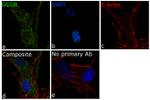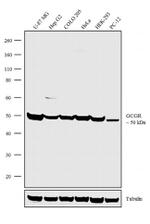Search Thermo Fisher Scientific
Invitrogen
Glucagon Receptor Recombinant Rabbit Monoclonal Antibody (21H1L9)
FIGURE: 1 / 2
Glucagon Receptor Antibody (702602) in ICC/IF


Product Details
702602
Species Reactivity
Host/Isotype
Expression System
Class
Type
Clone
Immunogen
Conjugate
Form
Concentration
Purification
Storage buffer
Contains
Storage conditions
Shipping conditions
RRID
Product Specific Information
This antibody is predicted to react with Monkey, Horse, Bovine, Dog
Recombinant rabbit monoclonal antibodies are produced using in vitro expression systems. The expression systems are developed by cloning in the specific antibody DNA sequences from immunoreactive rabbits. Then, individual clones are screened to select the best candidates for production. The advantages of using recombinant rabbit monoclonal antibodies include: better specificity and sensitivity, lot-to-lot consistency, animal origin-free formulations, and broader immunoreactivity to diverse targets due to larger rabbit immune repertoire.
Target Information
Glucagon receptors are G-protein coupled receptors for glucagon and play a central role in the regulation of blood glucose levels and glucose homeostatsis. It regulates the rate of hepatic glucose production by promoting glycogen hydrolysis and gluconeogenesis. Glucagon receptors also play an important role in mediating the responses to fasting. Ligand binding causes a conformation change that triggers signaling via guanine nucleotide-binding proteins (G-proteins) and modulates the activity of down-stream effectors.
For Research Use Only. Not for use in diagnostic procedures. Not for resale without express authorization.
References (0)
Bioinformatics
Protein Aliases: GL-R; Glucagon receptor; glucagon receptor perhaps same as Niddm3
Gene Aliases: GCGR; GGR; GL-R
UniProt ID: (Human) P47871, (Rat) P30082
Entrez Gene ID: (Human) 2642, (Rat) 24953

Performance Guarantee
If an Invitrogen™ antibody doesn't perform as described on our website or datasheet,we'll replace the product at no cost to you, or provide you with a credit for a future purchase.*
Learn more
We're here to help
Get expert recommendations for common problems or connect directly with an on staff expert for technical assistance related to applications, equipment and general product use.
Contact tech support
